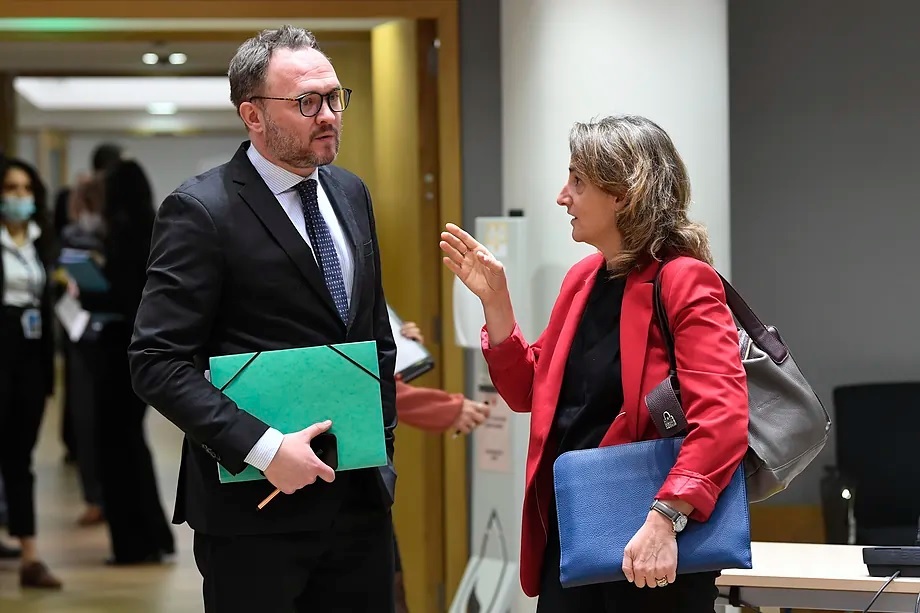The European Commission is relaunching nuclear energy for countries that wish to use it in the new international geopolitical environment, while the Spanish government currently maintains the closure schedule.
The European Energy Commissioner, Danish socialist Dan Jørgensen, confirms in a written parliamentary response that this year he plans to present two reports supporting this energy source, whose relevance he acknowledges in successfully transitioning to renewables.
In response to Finnish socialist MEP Eero Heinäluoma, the Energy Commissioner at the European Commission confirms that this year he will present the so-called Illustrative Nuclear Program, after almost a decade without updating it in Brussels, aimed at "analyzing the nuclear energy environment in the European Union and its investment needs."
Additionally, he states that he will support the deployment of new smaller and latest-generation nuclear reactors with another report. "The Commission will also present a Communication on Small Modular Reactors (SMRs) to support the development and deployment of SMRs in Europe during the 2030s, based on the SMR Industrial Alliance."
This is in response to the Finnish MEP, who had submitted a written question about the volatility of renewable energies - so far intermittent - and how it can be addressed with nuclear energy. "One solution is to have more clean base load energy, for example, based on nuclear energy. The recent report from the International Energy Agency states that nuclear energy can provide base load power and improve grid stability and flexibility," emphasizes this parliamentarian who is part of the socialist group in the European Parliament chaired by the Spanish Iratxe García.
Jorgensen agrees, but with the caveat that Brussels respects countries that do not want this controversial energy source: "Clean base load generation, such as nuclear, will complement the energy mix of Member States that choose to use it in the future."
The Commissioner recalls that this source is included in the so-called Taxonomy approved in the previous legislature by the former President of the Commission, Ursula Von der Leyen, heavily criticized by the then Vice President of the Government, Teresa Ribera. The Spanish, now Vice President of the Commission, will have to deal with the new nuclear energy reports announced by her Danish cabinet colleague. However, Ribera has already stated on several occasions that, from her current position, she respects that member states wishing to relaunch nuclear energy can do so. She also has a person in her cabinet, the Frenchman Thomas Auger, to participate in coordination work on nuclear energy.
According to Jorgensen, in the aforementioned written response, "the EU Taxonomy recognizes the contribution of certain nuclear and natural gas activities to accelerating the transition from more emission-intensive sources, under strict conditions."
He justifies maintaining the commitment to nuclear power plants and even opening new smaller ones because "the volatility of energy prices is due to the EU's dependence on fossil fuel imports." The Commissioner estimates that "by 2040, renewable energies are expected to represent the majority of the EU's energy mix, increasing from 17% in 2019 to 56%," but even then, they will need other supporting sources to ensure 24-hour operation. Therefore, "to integrate large amounts of variable energy, non-fossil flexibility is needed through demand response and energy storage. And nuclear energy is considered crucial in this regard."
In another written response, this time to MEPs Nora Junco, Diego Solier, and Alvise Pérez, Jorgensen argues that "the Commission recognizes the role of nuclear energy in contributing to energy security and decarbonization, although the decision lies with each member state."
One of those in favor is the Polish government, which has requested permission from Ribera, as Commissioner for Competition, to inject ¤14.4 billion in State aid to build its first nuclear power plant in partnership with the specialized U.S. group Westinghouse.
On the other hand, the Executive Director of the International Energy Agency (IEA), Fatih Birol, advocated on Tuesday, at an event organized by the Naturgy Foundation, for reconsidering Spain's current nuclear power plant closure schedule. According to Birol, Spain should reflect on this because the closure of its power plants is one of the three problems he identifies in Germany's energy policy, along with energy dependence on a single country (Russia) and abandoning the manufacturing of components for the solar industry, as reported by Servimedia. Birol emphasized that supply security, climate change, and energy costs are three challenges for the EU.
